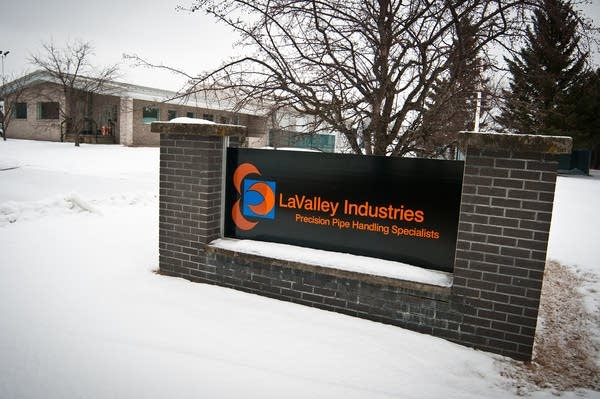"I had it all on the line"
Go Deeper.
Create an account or log in to save stories.
Like this?
Thanks for liking this story! We have added it to a list of your favorite stories.

A few years ago, Jason LaValley had no clue how to start or operate a business. The 34-year-old Bemidji high school graduate had no experience in engineering, marketing or manufacturing. Now he's running a multi-million dollar company that has 16 full and part time employees and is poised for growth.
Call it the theory of going all in.
LaValley worked for a decade as a horizontal drilling supervisor in the pipeline industry. One night in 2005, on a muddy work site in Corsicana, Texas, LaValley came up with an idea. An employee had just gotten hurt at the site, and LaValley was thinking of a way to make the work safer and more efficient. He envisioned a piece of hydraulic equipment -- a large gripper attachment for excavators -- that moves large pieces of pipe with precision around work sites.
In 2007, LaValley and some family members built a prototype in his garage. LaValley sank his life savings of $50,000 dollars into the idea, a risk that didn't go over well with his wife. It put their household finances in jeopardy.
Turn Up Your Support
MPR News helps you turn down the noise and build shared understanding. Turn up your support for this public resource and keep trusted journalism accessible to all.
As a young entrepreneur you leverage everything
"As a young entrepreneur you leverage everything," LaValley said. "I was four months behind on house payments. I was missing vehicle payments. I'd cut insurance. You know, I had it all on the line.
After rising for years, the number of new businesses registered in Minnesota peaked in 2009 and declined two years. But the numbers in January this year were up 15 percent over a year earlier, lending a sense that entrepreneurship like LaValley's could be on the increase.
LaValley got help from the Minnesota Department of Employment and Economic Development's Small Business Development Center in Bemidji. In fact, center director Jorge Prince was so impressed with the product that he accepted a job offer from LaValley. Prince is now LaValley's partner and chief financial officer.

After numerous rejections LaValley secured a $250,000 loan from a local bank. And in 2010 and 2011 LaValley entered and won something called the IDEA Competition, sponsored by the Northwest Minnesota Foundation. The goal of the competition is to identify innovators and encourage regional entrepreneurship.
Now, LaValley's product, called the Deckhand, is catching on. It's being used on pipeline projects across the United States, Canada and Australia.
LaValley's advice for would-be entrepreneurs is to be persistent.
"Don't give up," he said. "But yet at the same time, you've got to be honest with yourself. You've got to do the due diligence on the product and ask yourself, is this really a viable product to invest your money in? But once you make that commitment, don't look back.
"Once you're all in, you're committed. There's no turning back."
When we look at what has worked, it's been the homegrown entrepreneur.
Economic development authorities, economists and others tout the value of entrepreneurship, and communities, especially in rural areas, are eager to foster it.
There aren't any surefire guides, but that all-in mentality may be pretty common among successful entrepreneurs, according to a study that will be released in April by the Economic Development Administration Center at the University of Minnesota-Crookston.
The study polled about 70 successful businesses across rural Minnesota last year and found that two-thirds of them could be characterized as all-in entrepreneurs, said center director Jack Geller.
"They invested their own capital," Geller said. "They devoted themselves full-time to the position or to building the company. And these were also not hands-off managers. These people were completely vested in the financing, the operation and the management of their company."
The study also found that two-thirds of successful business owners came from a family pedigree of entrepreneurs. And while Geller says they valued education, more than half reported having a two-year associate's degree or less.
While it might be hard to describe how a community might encourage entrepreneurs to develop an "all-in" attitude, the center's next study will look at the economic impact of northwest Minnesota's IDEA Competition.
The IDEA Competition launched in 2008, and has since awarded more than $200,000 to 13 contest winners. The winners range from mechanical innovations like the Turnabout, a mechanical attachment that allows pallet-moving jacks to turn on a very tight radius, to the Insect Inferno, a mobile heating unit that kills bed bugs and other insects.
Most winners, like LaValley, have reached commercialization. Together they've created about 30 jobs, with sales approaching $5 million.
Economic development consultant Michelle Landsverk of Fosston helped launch the IDEA competition. She says the competition model is fairly new to Minnesota, but it's gaining popularity across the country.
Landsverk says the idea is that some of the northwest region's biggest employers -- Marvin Windows in Warroad; Polaris in Roseau; and Arctic Cat and Digi-Key Electronics in Thief River Falls -- all started with local entrepreneurs with passion for a good idea.
She said regional economic development efforts are shifting toward cultivating those local innovators.
"We often use the phrase 'chasing smokestacks,' " she said. "You know, trying to recruit businesses from outside the region to come locate here.
"We haven't been very successful at that. But when we look at what has worked, it's been the homegrown entrepreneur.
Northwest Minnesota's IDEA Competition will name the latest winners at a ceremony in April.
Dear reader,
Your voice matters. And we want to hear it.
Will you help shape the future of Minnesota Public Radio by taking our short Listener Survey?
It only takes a few minutes, and your input helps us serve you better—whether it’s news, culture, or the conversations that matter most to Minnesotans.






